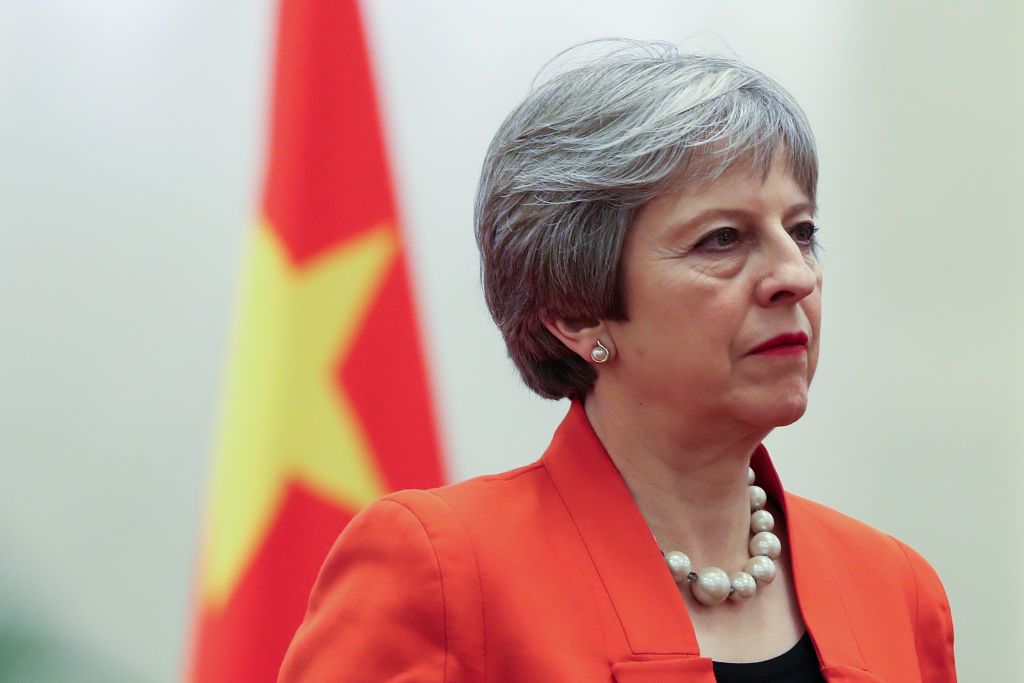In the wake of a doomed cabinet reshuffle, Theresa May is on the brink. The Spectator’s cover piece this week calls on the Prime Minister to lead or go, and Tory MPs are said to be close to triggering a leadership challenge, amid reports of a rising number of letters of no confidence in the PM. But it is not too late for May to save her skin, argues the Sun.
After all, Theresa May has shows an ability to constantly defy her critics. This is demonstrated in her ability this week to finally come around to talking up Brexit as a ‘golden opportunity’ for Britain, says the Sun. ‘At last’, the paper says. ‘For months, May has looked unable to do or say anything meaningful on any issue’, let alone Brexit. Could this new positive rhetoric be a sign things are changing? It is certainly time for the PM to finally wake up to ‘the trouble she is in’, according to the Sun. With ‘some Tories…in mutinous mood’, there is a very real threat to the Prime Minister, not least from an unnamed ‘senior minister’ who, according to the Sun, is planning to quit. Despite this brewing trouble for the PM, it is not too late for May though, with the paper arguing that she can take three steps to prolong her time in office. First, she needs to continue to talk up Brexit in the manner she did on her trip to China, by referring to a ‘better future for our economy’. May must also tackle the housing crisis and let Sajid Javid get on with the job of tacking on ‘the big developers’. Finally, ‘on health, she must review NHS and social care funding and back cross-party efforts to build a long-term strategy’. Only in this way can the NHS be saved from a ‘permanent crisis’. If she takes this three-pronged approach – and avoids doing what she usually does and ’making vague speeches’, she can survive.
On her trip to China, the PM is keen to talk up the possibility of doing business with the country after Brexit. The Financial Times is not convinced though this will necessarily be the Brexit boon some are hoping it might be. The paper says that in the wake of our departure from the EU, Britain ‘may feel itself in need of friends in the world trading system’. China is one such target. But, the paper says, May is right to be more cautious in linking up with the country than David Cameron was. China, for all its merits, remains ‘frequently opaque about finance and management’. It is also ‘not…above opportunistically throwing its weight around in the local politics of foreign countries’. So Britain must be wary when dealing with a country which has shown a constant and unashamed willingness to put its own interests first. Hinkley Point is a case in point, argues the FT, which says that this episode shows that the UK must ‘do a better job of rigorously applying cost-benefit analyses and obeying rules on state aid’ in its dealings with China. Of course, it is right for the UK to ‘engage with China’. But Britain should remember that Beijing remains ‘an all but closed market for Britain’s key export — services’. With this in mind, it means ‘there is no need for the UK to play the supplicant’, the paper concludes.
Meanwhile, the Daily Telegraph looks across to the US, and says that Trump’s State of the Union address makes one thing clear: he is playing a better political game than his detractors. Trump took credit for America’s ‘economic success’. And while ‘much of the increase in employment dates from before he became president’, Trump knows that ‘the art of politics is to claim credit even when it is not fully deserved’. Trump wasn’t only talking himself up though, he was also ‘making a deliberate, almost Herculean, effort to be nice’. The Telegraph cautions that this new approach ‘could all be undone with a moment’s tweeting’. But it goes on to say that, if the president ‘really is serious’ about changing his approach, Trump could have some success in ‘mending the deep societal divisions in America’. After all, who better to do so than Trump, a man who, the Telegraph argues, ‘personifies’ these very differences. Trump’s speech would certainly have been a surprise to those critics who see him as an ‘egomaniac’: he said ‘we’ 130 times, and ‘I’ only nine, the paper points out. But the president has not forgotten his base either, pledging to ‘keep open’ Guantánamo Bay . He also vowed to continue his crackdown on immigration. Nonetheless, he ‘showed a willingness to pivot to the centre’, a clever political shift, which, the Telegraph concludes, shows Trump is beating his enemies at their own game.
But the Guardian is not convinced that Trump is really changing his ways. The president ‘basked in the limelight’ this week, the paper says, arguing that he was ‘applauded merely for being ‘Teleprompter Trump, not Twitter Trump’. What’s more, despite the hype about the State of the Union address, it should be remembered that such occasions ‘rarely prove memorable, let alone groundbreaking’. Indeed, Trump opted for ‘self-congratulation’ throughout much of his address and ‘(laid) out little in the way of plans’. It is also difficult to accept Trump’s plea for bipartisanship, the paper says, arguing that ‘calls…for unity…were garnished with winks to his base’. Trump’s speech was presidential in that it was delivered “in the style of a president”. Yet Trump clearly failed to ‘(rise) to the office (of president)’. ‘The State of the Union is supposed to be a ritual expression of the president’s duties to the American people’, concludes the Guardian. But for Trump, a man, the paper says, who has ‘no sense of duty’, this counts for very little.







Comments